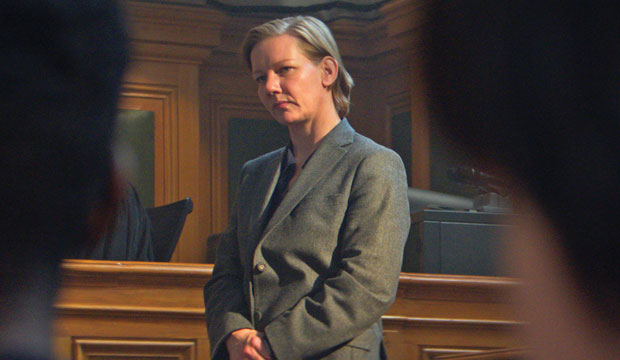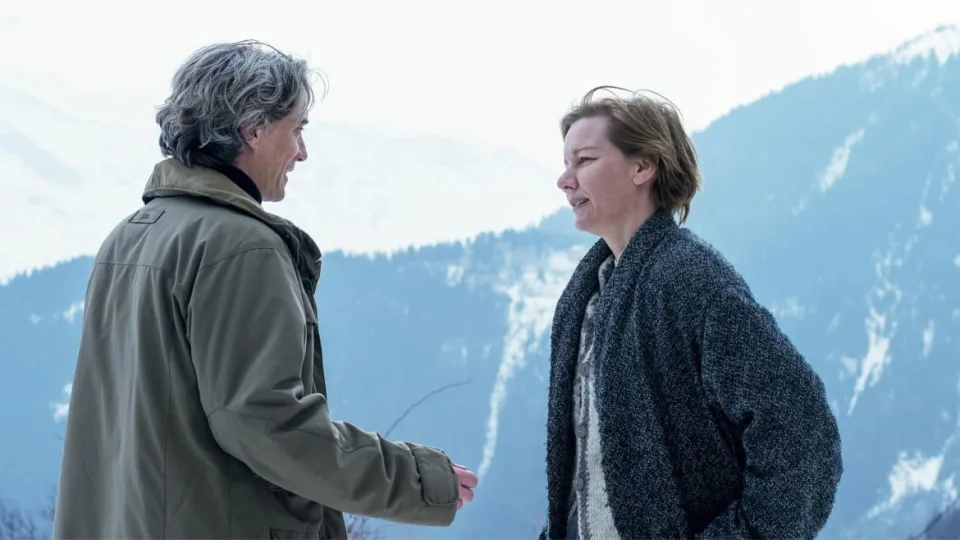Anatomy of a Fall
15¦ DVD, Blu-rayIt’s surprising how certain genres catch the imagination of an audience. For example, It feels like ever since the success of Netflix’s Tiger King, the true crime documentary has just exploded.
It’s even infiltrated into fiction, with the likes of Only Murders in the Building, that playfully uses true crime plots and parodies them to great comic effect.
And although this French drama isn’t a documentary, it certainly borrows traits that heighten its realism, focusing on the death of a husband at home.

That suit is just too big - she definitely did it!
Living in a remote chalet just outside of Grenoble, south-eastern France, are couple Sandra (Sandra Hüller) and Samuel (Samuel Theis), with their son Daniel (Milo Machado Graner). Sandra is a successful writer, and her husband, who although has aspirations to write, is currently home-schooling their son, as well as renovating their chalet, with the aim of turning some of it into a B&B.
Sandra gets a rare visitor, with someone who has come along to interview her, but it soon gets disrupted when her husband decides to blast his music from upstairs, and Sandra thinks it best to postpone the interview to another time, and decides to go to her room and put earplugs in.
Meanwhile their son Daniel, who suffers from a visual disability after getting involved in a road accident, decides to take the family dog Snoop for a walk. On his return, he’s horrified to discover a body outside of their home – it’s his father, lying dead in the snow.
As there was only Sandra and Samuel alone in the house at the time, only one of two scenarios could have taken place: he either fell or was pushed.
Sandra soon finds herself on trial, where her entire relationship with her husband comes under scrutiny for all to see in court, where there’s only one question that needs answering: did she do it?

I get it, he's dead, but now it's time for fondue!
Although a work of fiction, you can’t help but suspect that French director Justine Triet’s film was inspired by the current appetite for true crime drama. And although the court room drama is no stranger to Hollywood, Triet ignores the obvious dynamic drama route for something far more subtle and sophisticated.
It is a film that slowly unravels itself, possibly a little too slowly at two and a half hours long, but it does give Triet time to both develop and explore her characters. The title alludes to what’s to come, with a thorough investigation of the crime. But it’s more than that, as it’s more of a dissection of a relationship; it’s only in court that we get a measure of not only the couple as a couple, but more importantly, as individuals.
For instance, their relationship is the definition of a Venn diagram, with not only their son in the middle, but the use of English as a neutral language to communicate in, with Sandra being German and Samuel French. And as the trial continues more information is known about them that falls into their own segment of their circle.
There is one element that prevents this from being a fiery French family drama, and that’s Sandra; she has a very German, pragmatic approach to her life and relationship, where she doesn’t let emotions get the better of her. It’s her emotional state that grounds the entire film, fuelling its true crime credentials. Because of that it’s very un-French, which makes it all the more fascinating.
It certainly struck a chord with French audiences, which led to it winning this year’s prestigious Palme d’Or.
It wasn’t the only award it won however, as it also picked up the Palm Dog too, which the terrific Messi deserved for his outstanding role as pet Snoop, who truly has one of the most dramatic scenes in the film.
Without the Hollywood style grandstanding, Triet’s reserved approach gives an audience that sense of guessing did she or didn’t she throughout the whole thing, just as they might a true crime doc.
With such a simple premise, Triet creates a scenario that sees a relationship dissected after its death, much like that of a corpse, that manages to recruit the audience as a member of its jury, as we deliberate its outcome. The verdict is a film that slowly but surely reels you in, delivering what is an intriguing, slow burn of a court room drama.
